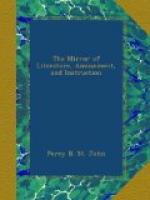The following is a story from a MS., copied by Gaillard, in his Life of Francis I.:—
Duprat said in one of the conversations with the emperor’s minister, that he would consent to lose his head if his sovereign had aided Robert de la Mark against Charles. The Spanish chancellor claimed du Prat’s head as forfeited, for, he said he had in his possession letters which proved Francis’s connivance with Robert de la Mark. “My head is my own yet,” replied Du Prat, “for I have the originals of the letters you allude to, and they in no manner justify the scorn you would put upon them.” “If I had won your head,” replied the imperial chancellor, “you might keep it still. I protest I would rather have a pig’s head, for that would be more eatable.” Monthly Mag.
* * * * *
The Novelist.
* * * * *
FAIR FANARIOTE.
In consequence of the numerous revolutions that have accompanied the fall of the Greek empire in Byzantium, most of the inhabitants of Fanari, near Constantinople, boast of being descendants of the dethroned imperial families; a circumstance which is probable enough, and which nobody takes the trouble to dispute, any more than the alleged nobility of the Castilian peasantry, or the absurd genealogies of certain great families.
In a retired street in Pera, (one of the suburbs of Constantinople,) a descendant of the Cantacuzenes followed the humble calling of a butcher; but, in spite of industry and activity, he had great difficulty in earning a sufficiency to pay his way, and maintain his wife and his only daughter, Sophia. The latter had just entered her fourteenth year, and her growing beauty was the admiration of the whole neighbourhood.
Fate, or, if you please so to call it, Providence, ordained that the poor butcher should suffer repeated losses, which reduced him to a condition bordering on beggary. His wife unfolded her distressed circumstances to a Greek, one of her relations, who was Dragoman to the French embassy, and who, in his turn, related the story to the Marquess de Vauban, the ambassador. This nobleman became interested for the unfortunate family, and especially for Sophia, whom the officious Dragoman described as being likely to fall into the snares that were laid for her, and to become an inmate of the haram of some Pasha, or even of a Turk of inferior rank. Prompted by pity, curiosity, or perhaps by some other motive, the ambassador paid a visit to the distressed family. He saw Sophia, was charmed by her beauty and intelligence, and he proposed that her parents should place her under his care, and allow him to convey her to France. The misery to which the poor people were reduced, may perhaps palliate the shame of acceding to this extraordinary proposition; but, be this as it may, they consented to surrender up their daughter for the sum of 1,500 piastres, and Sophia was that same day conducted to the ambassador’s palace. She found in the Marquess de Vauban a kind and liberal benefactor. He engaged masters to instruct her in every branch of education; and elegant accomplishments, added to her natural charms, rendered her an object of irresistible attraction.




